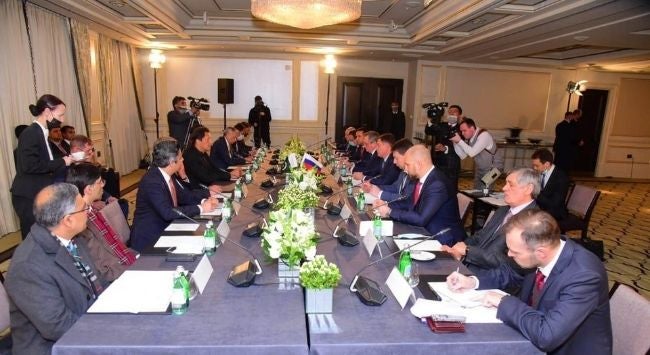Pakistan, the UN and the Economic Fallout of the War: The Makings of a Lose-Lose Situation?
Imran Ahmed
10 March 2022Summary
Pakistan’s decision to abstain from voting in Ukraine-Russia matters at the United Nations has been the subject of considerable scrutiny. Islamabad’s strained relationship with the United States has seen Pakistan move closer to Russia. But the war has spotlighted new limits to Pakistan-Russia bilateral ties. While Pakistan Prime Minister Imran Khan is correct in his assessment that developing countries will be hard hit by the conflict, much of his reasoning for close ties with Moscow has been on economic grounds. However, criticism has been related to whether Khan is chasing the appropriate economic goals and whether Russia can deliver.
As the United Nations (UN) General Assembly urged Russia to withdraw its forces from Ukraine, there has been mounting international pressure on Islamabad to denounce Russian aggression. A letter jointly signed by 22 foreign envoys to Pakistan as well as the head of the Delegation of the European Union to Pakistan called on Islamabad to vote in favour of a Resolution in the UN General Assembly aimed at condemning the Russian invasion of Ukraine. Russia had earlier vetoed a UN Security Council resolution which demanded the immediate withdrawal of Russian forces from Ukraine. As a result, an emergency session of the UN General Assembly was called and the new but non-binding resolution presented before member states denounced Russian aggression against Ukraine in the strongest terms and demanded that Russia cease its use of force against Ukraine, and immediately, completely and unconditionally withdraw all its military forces from Ukrainian territory. Of the 193 member states, 141 voted in its favour, while 34 states abstained from the vote, including Pakistan.
Pakistan’s permanent representative at the United Nations, Munir Akram, reasoned that the decision was based on his country’s national interest and that Pakistan could not support the Resolution since it did not address Russia’s security concerns related to the North Atlantic Treaty Organization. Akram further argued that “If we take a one-sided position, then we have no room for diplomacy.” In the initial hours of the invasion, Islamabad stated that it hoped diplomacy could avert a military conflict since developing countries are always hit the hardest economically in cases of conflict. And this remains a major concern for Pakistan, grappling with dire energy and food security issues. Indeed, Prime Minister Imran Khan defended his recent trip to Moscow, stating, “We went there because we have to import 2 million tons of wheat from Russia. Secondly, we have signed agreements with them to import natural gas because Pakistan’s own gas reserves are depleting.”
However, this logic has come under increasing scrutiny. There is growing criticism related to whether Khan is chasing the appropriate economic goals, his approach to managing Pakistan’s economic crisis and whether Russia can deliver. The immediate impact of the invasion has seen energy prices soar. And Khan’s response to cut the prices of gasoline, diesel and electricity are but short-term measures and counter to the agreements Pakistan had reached with the International Monetary Fund, since slashing fuel prices will add to the existing fiscal deficit and potentially create more medium-term economic instability. Others have put to question whether Khan’s justification for the Moscow visit on the grounds of reinitiating work on the multi-billion dollar Pakistan Stream Gas pipeline makes financial sense at a time when securing shipments of liquified natural gas is proving more and more difficult. Price volatility, the risk of sanction-related delays and other unsettled contractual points in the deal puts the feasibility of the project into question.
There are also ongoing concerns of Pakistani exporters who face payment delays from Russia because of sanctions imposed on Moscow. In a letter to the Ministry of Commerce, the All Pakistan Fruits and Vegetable Exporters, Importers and Merchants Association noted that “exporters of our sector who export Kinnow & Potato to Russia & Ukraine have been severely hit by this conflict…payments from Russia have been stuck up due to sanctions on Russia and now the exporters are facing liquidity problems.” The Association argues that problems of financing look to worsen for exporters if the conflict is protracted.
These issues now spotlight a pressing point: what alternatives to Russia does Pakistan have in addressing its energy, food security and income needs should, or perhaps when, Russia falls short in its capacity to deliver?
. . . . .
Dr Imran Ahmed is a Visiting Research Fellow at the Institute of South Asian Studies (ISAS), an autonomous research institute at the National University of Singapore (NUS). He can be contacted at iahmed@nus.edu.sg. The author bears full responsibility for the facts cited and opinions expressed in this paper.
Photo Credit: Prime Minister of Pakistan Photo Gallery
-
 More From :
More From :
-
 Tags :
Tags :
-
 Download PDF
Download PDF



